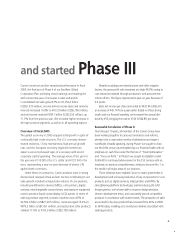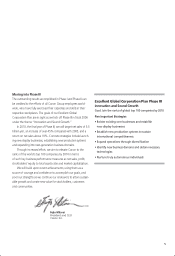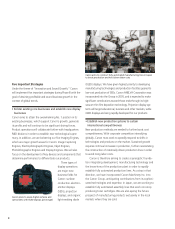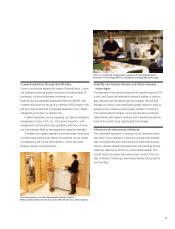Canon 2005 Annual Report Download - page 15
Download and view the complete annual report
Please find page 15 of the 2005 Canon annual report below. You can navigate through the pages in the report by either clicking on the pages listed below, or by using the keyword search tool below to find specific information within the annual report.
13
Exchange Act, which provides that a
foreign private issuer which has estab-
lished a board of corporate auditors shall
be exempt from the audit committee
requirements, subject to certain require-
ments which continue to be applicable
under Rule 10A-3.
Pursuant to the requirements of the
Code and the Special Exception Law, the
shareholders elect the corporate auditors
by resolution of a general meeting. The
Company currently has four corporate
auditors, although the minimum num-
ber of corporate auditors required
pursuant to the Code and the Special
Exception Law is three.
Unlike the NYSE Corporate
Governance Rules, Japanese laws and
regulations, including the Code and the
Special Exception Law, do not require
corporate auditors to be experts in
accounting or to have any other area of
expertise. Under the Special Exception
Law, a board of corporate auditors may
determine the auditing policies and
methods for investigating the business
and assets of a company, and may
resolve other matters concerning the
execution of the corporate auditor’s
duties. The board of corporate auditors
prepares auditors’ reports and may veto
a proposal for the nomination of corpo-
rate auditors and accounting auditors
put forward by the board of directors.
Under the Special Exception Law,
more than half of a company’s corpo-
rate auditors must be “outside” corpo-
rate auditors. These are individuals who
are prohibited to have ever been a
director, executive officer, manager, or
posed entirely of independent directors,
the Code and the Special Exception Law
do not require companies to have
specified committees, including those
that are responsible for director nomina-
tion, corporate governance and execu-
tive compensation.
The Company’s Board of Directors
nominates candidates for directorship
and submits a proposal at the General
Meeting of Shareholders for shareholder
approval. Pursuant to the Code, the
shareholders then vote to elect directors
at the meeting. The Code requires that
the total amount or calculation method
of compensation for directors and
corporate auditors be determined by a
resolution of the General Meeting of
Shareholders, unless the amount or
calculation method is provided under
the Articles of Incorporation. As the
Articles of Incorporation of the
Company do not stipulate the require-
ments as expressed under the Code, the
amount of compensation for the direc-
tors and corporate auditors of the
Company is determined by a resolution
of the General Meeting of Shareholders.
The allotment of compensation for each
director from the total amount of
compensation is determined by the
Company’s Board of Directors, and the
allotment of compensation to each
corporate auditor is determined by
consultation among the Company’s
corporate auditors.
3. Audit Committee
The Company avails itself of paragraph
(c)(3) of Rule 10A-3 of the Security
employee of the company or its sub-
sidiaries. As of December 31, 2005,
there are four members on the
Company’s Board of Corporate
Auditors, two of whom are outside
corporate auditors. The Company’s
current corporate auditor system meets
these requirements. The qualifications
for an “outside” corporate auditor
under the Special Exception Law are
different from the audit committee
independence requirement under the
NYSE Corporate Governance Rules.
4. Shareholder Approval of Equity
Compensation Plans
The NYSE Corporate Governance Rules
require that shareholders be given the
opportunity to vote on all equity com-
pensation plans and any material revi-
sions of such plans, with certain limited
exceptions. Under the Code, however, a
company is only required to obtain
shareholder approval if it desires to
adopt an equity-compensation plan
under which stock acquisition rights are
granted to the recipient on especially
favorable terms (except where such
rights are granted to all of its sharehold-
ers on a pro-rata basis at the same time).
In such circumstances, a company is
required to obtain approval by special
resolution (as defined in the Code) at its
general meeting of shareholders. The
Company currently has not adopted any
stock option compensation plans.
























